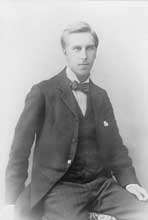
- 7 clarence grove
- horsforth
- leeds, LS18 4LA
- UK
- tel: 0113 258 1300
- order online
- www.editiondb.com
- info@editiondb.com
Thomas F Dunhill (1877 – 1946)
Thomas Dunhill spent his childhood in North London, the fourth of five children born to a “purveyor of tarpaulins, canvas and other requisites for horse-drawn vehicles.” His brothers, Alfred and Herbert, inherited their father’s interest in business, successfully taking the company into the age of the motor car and then opening a pipe shop which they later developed into the Dunhill tobacco empire. Thomas, however, had other ideas, and later recalled that when he was only five he had been overwhelmed by hearing the family’s piano tuner play a particularly grand version of the March from Handel’s Scipio. Convinced that this was the most wonderful piece ever written, he learned to play a simpler version of it himself, and before long had begun to develop a deep interest in musical theatre in general. During his teens he spent most of his pocket money going to performances of Gilbert and Sullivan and to the Saturday “Pops” concerts at St. James’ Hall, and in 1893, when he began to study at the Royal College of Music, he had written about a dozen short operas. This was an exciting time to be studying music - Ireland, Holst and Vaughan Williams were also at the RCM – and in 1897 Dunhill was ecstatic to learn that he was to share with Ireland an open scholarship in composition. “Mad with excitement and joy,” he wrote in a telegram to his parents, and his diary records his relief at the prospect of three more years’ composition lessons with Charles Villiers Stanford.
The Quintet for 2 violins, viola, cello and horn, op. 6 was composed during 1899 and 1900. By now Dunhill was working as assistant music master and piano teacher at Eton College but still took composition lessons with Stanford. The score quotes as its subtitle the motto of the 18th Century politician Edmund Burke, “Nitor in adversum” (“I struggle in adversity”) and while Dunhill did not explain it is there, something of its meaning is reflected in the urgency of the outer movements. It was first performed at a concert at Alexandra House, the RCM’s women’s hostel, on 27th June 1900, when the players included the 18 year-old Haydn Wood - later to become a distinguished composer of light music – and Hale Hambleton, a horn player whose family has participated in London’s professional music-making circles for over 140 years. The performance was ignored by the musical press, however, and Dunhill’s fair copy of the score remained unheard again until it was recorded by Stephen Stirling and Endymion in 2005.
John Humphries
